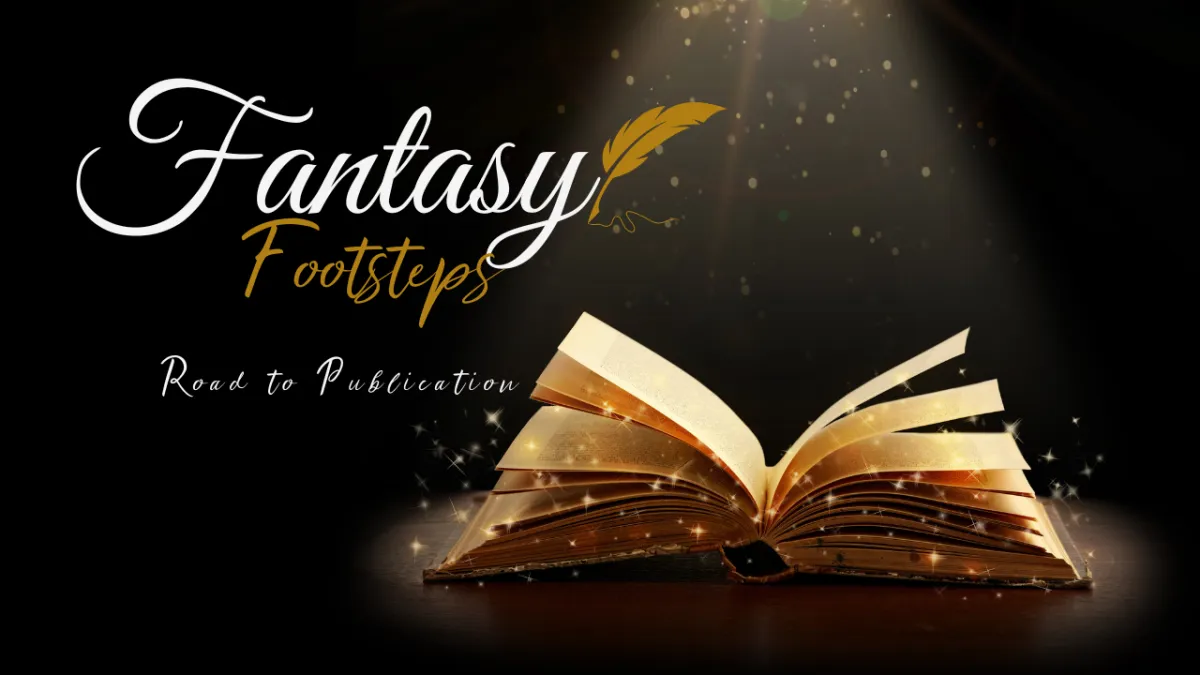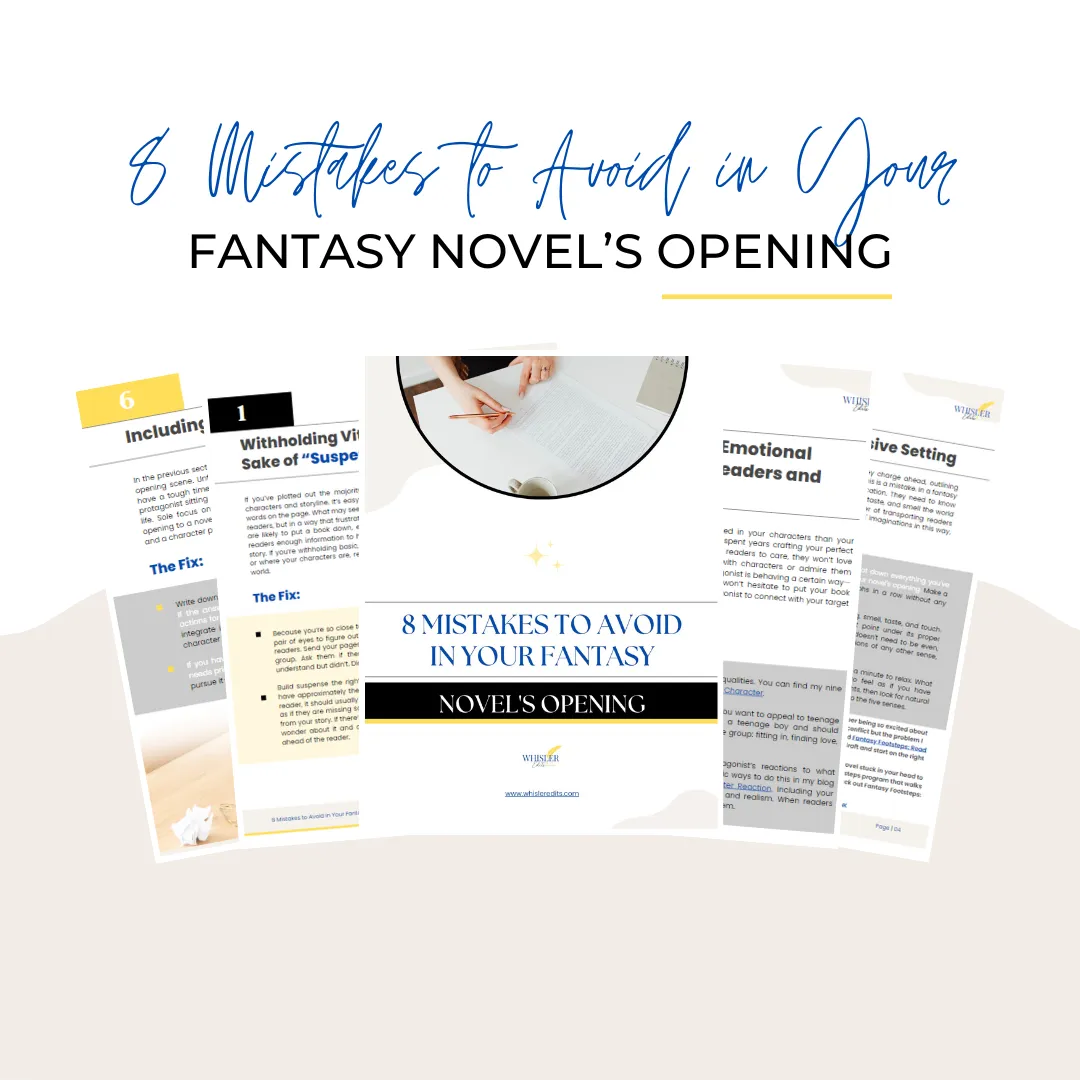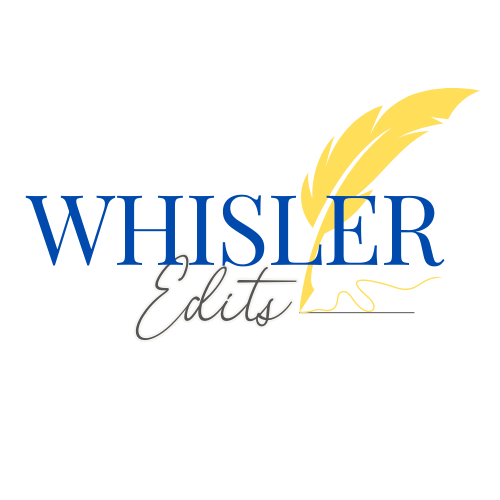8 Mistakes to Avoid
in Your Fantasy Novel’s Opening
Don’t let common mistakes lose your readers!

Your Novel Matters ...
Looking for the right book coach for your fantasy novel?
Are you a fantasy writer …
… struggling to convert the vivid scenes of your fantasy novel from your imagination to the page?
… stuck in a loop where you constantly rewrite your opening pages?
… worried your story won’t resonate with your readers?
What if I could show you the exact steps week to week that would take you from brainstorming and drafting to revising and publication?
I specialize in developmental editing and book coaching for writers of fantasy novels—writers who value the craft of storytelling and wish to create stories that resonate.
My Services
Develop Your Ideas
Fantasy Footsteps: Road to Publication

I’ll let you in on a secret. All you need to succeed as a writer are three things:
A Roadmap: Illuminate your path with a step-by-step guide, ensuring you achieve your writing goals every week. From outlining to publishing, every stage of your journey is mapped out for success.
Mindset Mastery: Learn how your thoughts control your outcomes in your writing. Overcome self-doubt and unearth the confidence that will bring your unique ideas to life on the page.
Personalized Support: Prepare for comprehensive assistance, real-time accountability, and feedback tailored to your needs. From brainstorming sessions to final publication, you'll have a dedicated ally guiding you every step of the way.
With these three pillars, you'll unlock the potential to:
Craft a captivating story that enthralls readers from the first page to the last.
Develop complex characters and immersive worlds that resonate deeply with your audience.
Navigate the complexities of plot twists and pacing, keeping readers hooked until the final chapter.
Receive specific guidance on refining your scenes so that readers root for your protagonist.
Overcome writer's block and stay motivated throughout your writing journey, ensuring consistent progress.
Transform your rough draft into a polished, professional manuscript ready for publication.
Are you ready to turn your fantasy novel from a mere vision into a masterpiece that captures hearts and minds?
Join Fantasy Footsteps: Road to Publication and begin your author journey with everything you need to write a story that works.
Don't let your story remain trapped in your mind—bring it to life with me!
If you’re thinking, “Yes, please! Tell me what to do!” , I’d like to invite you to work one-to-one with me to finish your novel and write a story that works. Join my book coaching program designed specifically for fantasy writers—Fantasy Footsteps: Road to Publication.

Discover Helpful Tools
Resources For Writers
Here you will find some of my favorite resources for writers.
Add these books, podcasts, websites, and other resources to your writing toolbox to augment your writing at any stage.
Join My Free, Private Facebook Group
Finish My Fantasy Novel: Write & Revise My Best Book in 6 Months
In the group, I go live weekly with writing tips. The group is also a platform for writers to support each other and share their wins and progress.
Live training schedule:
1st Tuesday of the month: Free critique for someone in the group!
2nd Tuesday of the month: Writing sprint with fellow writers
3rd Tuesday of the month: Live training on a specific topic
4th Tuesday of the month: Interview with an author or marketing/business expert


Improve Your Craft
Writing Advice Blog
As a developmental editor and book coach, everything I post is designed to help you build your creativity, strengthen your prose, and explore new avenues in your writing. The opinions in each post are my own, but many are inspired by ideas from established authors and editors who excel in their fields.
Rely on my blog for clear and specific writing advice, motivational tips and grammatical aid, and interviews with experts!
Hi! I'm Nicole.
I’m a Developmental
Editor & Book Coach for Fantasy Writers.
Like you, I'm a writer. I understand the mental and emotional ups and downs of storytelling. Don't let resistance win! Recognize the value of good advice plus hard work.
My approach to novel writing is multifaceted. For a deeper understanding of my process and style, take a look at some of my favorite craft-of-writing books in my Resources section.
What can I say about myself? I read, I write, I read about writing, and I write about reading. It never gets old to me.

See what writers like you are saying . . .

Nadir Shirazi
“I’ve been stalling on my Islam-inspired sci-fantasy series for 10 years. But within 10 minutes of starting Nicole’s program, I started writing again."

Amanda Emerick
“I can’t recommend Fantasy Footsteps enough to writers who are legitimately looking to polish their craft, write, and eventually publish their novel."

Trinity Cunningham
“I loved discussing my story with Nicole. She provided me with invaluable insights I never would have considered on my own."
Latest on the Blog

You will find no pictures of kittens here. No images of favorite dessert recipes, snapshots of my recent vacations, videos of puppies playing the piano (although I do love dogs), or YouTube clips of monkeys stealing people’s sunglasses.
I’m genuinely sorry if that disappoints you.
Instead, you can rely on my blog for clear and specific writing advice, motivational tips, grammatical aid, and author/editor interviews.
As a developmental editor & book coach, everything I post is designed to help you build your creativity, strengthen your prose, and explore new avenues in your writing. The opinions in each post are my own, but many are inspired by ideas from established authors and editors who excel in their fields.
Some of these tips might be just what you need to hear. Others might not work for you personally, and that’s okay.
Apply the tips that fit your personality and writing habits, and feel free to adapt or ignore the others. For further questions and comments, you can email me or reach me through my Contact page.

5 Ways to Maintain Your Writing Momentum
Discover in this post …
the value of momentum in your writing.
five ways to keep you moving forward in your writing each day.
explanations of how to put the given strategies into practice.
Stop That Lollygaggin’
My seven-year-old is the ultimate lollygagger.
She has three jobs to accomplish each morning before school starts:
Use the bathroom.
Brush teeth.
Put on clothes and shoes.
You’d think this would take five minutes at most. And yet, more often than not, my husband or I will remind her to get dressed, leave her in her room, and come back ten minutes later to find she has done nothing—unless you count distracting herself with a toy or staring at the wall. Sometimes she has moved backward and lost her outfit altogether!
But yesterday morning, something odd happened. When I walked into my living room at seven a.m., ready to change my two-year-old and brush my daughters’ hair, my seven-year-old was already standing there, fully dressed, asking me to smell her breath (to prove she brushed her teeth).
I blinked at her, rechecked the time, and asked, “How did you get ready so fast?”
She smiled at me and said, “Well, I woke up and had to go to the bathroom. Then I just brushed my teeth because I was already there … and then I decided to put on my shirt and pants … and then I put on my shoes … and now I’m ready!”
I knew exactly what she’d done. I just wished she did it more often.
She’d relied on her momentum.
Instead of making a mountain out of each task, focusing on how sleepy she was, or playing with toys in her room, she accepted each simple duty in a logical sequence and kept going.
Wouldn’t you love if writing a book were that simple?
“Well, I wrote Chapter 1 … and then I kept writing until I got to the middle … then I just wrote some more until I got to the end … and now I have a book!”
Although there are many choices to make and items to address while writing a novel, at its core, that’s what it takes to finish a book. To just. Keep. Writing. Picture Dory from Finding Nemo swimming around your head while you sit at your writing desk: “Just keep writing, just keep writing!”
But it can take months, sometimes years, to finish a book. How do you keep your momentum during all that time? Well … there’s no magic system. You’re the only one who can guarantee your own success by establishing clear goals and working toward them. But I’ve found that applying the following five strategies (or sifting through them to determine which would be valuable) can allow writers to take significant leaps toward their writing goals rather than approach them at a crawl.
And once you find that sweet spot—when you create a system that prompts those ideas to flow, time and time again—anything is possible for you and your writing.
So let’s dive in and discuss the first strategy:
1 - Stop in the middle of a sentence.

How difficult is it for you to start a new scene, chapter, or section of your story? Do your ideas always flow, or do you often find yourself staring at that dreaded blank page, wondering if you should perhaps do a load of laundry or check Facebook before settling down to write?
If you resonate with the latter, consider your writing approach. Do you attempt to write a scene/chapter at a time? Do you generally feel accomplished when you’ve finished a specified section for the day? This is a normal goal for many writers, and although I’d certainly encourage you to continue this process if it’s working for you, I’d like to offer another option if you’ve never tried it:
Stop in the middle of a sentence for the day.
“What?!” some of you might say. “That would drive me nuts!”
True, that could happen. But stopping in the middle of a sentence at random makes your brain automatically want to finish that sentence—and continue your story. Your brain will likely keep working on your story on a subconscious level for the rest of the day and even overnight. By preventing yourself from tying up your daily writing in a neat little bow, you’re prolonging the process. You’ll never feel fully finished … until you are.
On the flip side, if you stop at the end of a chapter each day, your brain may raise considerable resistance when it’s time to start again the following day. It can be tough to start something new, but it’s exciting to continue something familiar, something that held you in its grip the day before, and your brain knows it.
Remember that’s how storytelling works. You string together enough sentences, enough scenes, and you eventually have a draft. It won’t be perfect, but perfection isn’t your goal for your first draft. Once you have a completed draft, you can step back, assess your story as a whole, and address the areas that warrant attention. That’s how some of the greatest stories come to life, a little at a time!
2 - Turn off all notifications and internet.

This is the kind of advice that makes people nod and say, “Yeah, yeah, that’s obviously a great idea. I can do that anytime I want.”
But when it comes down to it, many writers … don’t. They like to stay informed, receive notifications, keep Google at their fingertips. After all, what if they need to research a specific terrain or generate a random name for a side character? It will just take a second. A minute at most. Better keep those notifications on and the internet connected, right? It just makes sense.
If you can truly limit yourself to your intended timeline and keep moving forward at a steady pace (not in theory but in practice), then great! But if you’re prone to chasing rabbits—if the three minutes you intended to spend on Facebook easily turn into thirty on a regular basis—then I’d recommend getting stern with yourself, setting expectations for your workspace, and sticking to them.
Later, when it’s time to revise your scene, put on your editor’s hat and have at it! Research those martial arts details to make sure your fight scene is realistic. Find the perfect name for your protagonist’s sister. Read and apply that social media post you found about building an immersive fantasy world.
But wait for the right time. Most people don’t accomplish half as much multitasking as they do when they challenge themselves to focus on a single task—which brings us to my next favorite way to maintain your writing momentum:
3 - Try the Pomodoro Technique.

In the late 1980s, a university student named Francesco Cirillo used a tomato-shaped timer to create his own study schedule. He studied for twenty-five focused minutes (one pomodoro), then allowed himself a five-minute break before beginning the next pomodoro (Italian word for tomato). Thus, the Pomodoro Technique was born. Millions of people use it today to achieve their goals—not just writers, but anyone who wants to accomplish a specific task in short bursts of time.
Why does it work? Because you’re training your brain to focus on a single item at a time (remember what I said above about multitasking?), you’re allowing for a break to avoid growing overwhelmed, and you’re setting a timer to generate a sense of urgency (ever noticed that many people work better with a deadline?).
After all, if you’ve heard of Parkinson’s Law, you’re aware that “work expands to fill the time allotted for its completion.” In other words, it’s human nature to drag out our goals until we’re forced to complete them. If we have four hours to write a single scene, it could easily take us the full four hours. But if, for some reason, we have only two, we could likely write the scene in half the time.
Here’s how you can apply the Pomodoro Technique to your writing:
Choose a specific task you believe you can accomplish in twenty-five minutes (examples: write 500 words, finish current scene and start the next, complete final section of outline).
Turn off all notifications, remove all distractions, and set a timer for twenty-five minutes.
Write (or outline or revise according to your goal) for twenty-five minutes straight. Don’t stop until the timer goes off.
Take a five-minute break. Grab a drink, stretch your legs, or chat with the people around you if you’re writing with others nearby. Studies show that people will actually increase their longevity just by getting up and walking around outside for five minutes every half hour—and get more work done too!
Evaluate whether you met your goal, adjust it as necessary for your second session (because it should challenge you but should also be possible to complete), and dive into another twenty-five-minute sprint.
You can repeat the process as often as necessary. If you write for more than four pomodoros in a row, take a longer break (fifteen to twenty minutes) at the end of your fourth session. It can also help to reward yourself at the end of a session or day if you’ve worked hard and are proud of what you’ve accomplished.
Although this technique may not be for everyone (someone who focuses easily and prefers to write for five hours in a row, for example, would have no need of it), it can work wonders in the right conditions. If you haven’t tried it yet but you’re curious, give it a shot! I wrote the first draft of this section of my blog post using the Pomodoro Technique.
And what do you know, I finished before the timer. :)
4 - Join a writing critique group.

If you’ve never participated in a writing critique group, you might be shocked at how simple it can be to meet your word-count goals this way.
Why? Because accountability can work wonders.
If you’re unsure what I mean by “critique group,” I’m referring to a group of writers who meet regularly to discuss what’s working in everyone’s current scenes and what can be strengthened. In many cases, a critique partner can work equally well. If you’d like to learn more about critique groups (how to run them effectively, how to find one, etc.), you’re welcome to skim through my prior blog post: 10 Tips for First-Rate Critique Groups.
But for now, let’s stay on topic and discuss how critique groups can maximize your writing momentum.
Let’s say you join a critique group that meets every two weeks. Each time you submit a scene, you receive helpful, specific feedback from the people in your group, all of whom are familiar with your genre. If you find their comments valuable, and if you want to receive further feedback, you’re now motivated to continue your story and bring new material for your group to critique at the next session.
At the first writing critique group I attended, I was fully motivated to bring a new scene every month because I placed a great deal of value upon the feedback I received. I didn’t want to miss out, and during my years in that group, my writing never once went on pause.
What I described above is the ideal situation, of course. Let me mention two caveats here:
If you join a group that tears you down rather than encourages and motivates you, you likely won’t want to be held accountable. You won’t want to submit scenes, which defeats the purpose of keeping your momentum. Find the right group, and you’ll be set!
Be intentional about your writing goals once you join a critique group. It can be easy to process others’ feedback, revise your scene, and get caught in the trap of continuous revisions until you’re always backtracking and never moving forward. To fix this, simply determine what you want more: to finish your book’s first draft (in an acceptable state, knowing you can revise anything later) or to write a partial draft of near perfect chapters, yet never advancing to the end.
Join the right group, and the other members can help you stay on track!
5 - Skip to a new scene.

Who says you have to write a novel in chronological order? Sure, you’re welcome to do so if you’d like, but what about the times you don’t want to write that transition, or you’re unsure about attempting that section in the murky middle, or you don’t yet have the backstory or knowledge to do your villain justice the first time they appear on the page?
When that happens, you have two basic options:
Write the troublesome scene or transition anyway, knowing you can improve it in editing (definitely a decent idea to do this if you feel it’s possible for you), or
Skip to a scene you’re more excited to write.
When you tell yourself, “I can’t wait to write the moment Edgar declares his love for Sybil,” your brain senses your enthusiasm and kicks into gear, sparking inspiration and propelling you forward to advance your story.
One clarification here: I’m talking about switching to a new plot point within the same story. In most cases, I don’t recommend moving to a new story/novel altogether when you’re experiencing resistance to writing a certain scene. Unless you have clear intentions and know exactly what you’re doing, changing projects is typically a form of avoidance. By committing to the same project and filling in all the transitions and gaps at a later time, you’ll increase your chances that you’ll finish your story as intended and be one step closer to sharing it with the world.
I’ve shared five ideas to help spur your momentum, but this isn’t a comprehensive list. What helps you consistently move forward in your own writing? Which of the five strategies above have you already tried, and which would you like to add? Let me know in the comments!
Do you want to learn how to write a story that makes your target readers stand up and cheer? If you’d like support from A to Z (from brainstorming to drafting to revising to publication), book a Discovery Call with me to see if you’re a good fit to join my book coaching program, Fantasy Footsteps: Road to Publication. And if you haven’t done so already, grab your Free Guide on how to hook readers from your story’s start!

Capture Your Readers from Your First Scene
Download my exclusive guide—8 Mistakes to Avoid in Your Fantasy Novel’s Opening. Start your fantasy novel right!
Are you worried you've failed to establish a bond between readers and characters in your first chapter? Do you wonder if you've bogged readers down with your worldbuilding? Do you sometimes overlook essential conflicts? Many readers will put your book down if it doesn't grab their attention right away, so it's vital to evoke powerful emotions from readers as early as possible.
Don't let these common mistakes rob your story of its magic and momentum. Save your precious time and energy by ensuring you hook readers from the start. Grab your guide now and check your opening against these common missteps!
(You will also receive monthly writing advice, updates about my free live trainings, and direct access to replays. Unsubscribe anytime.)

